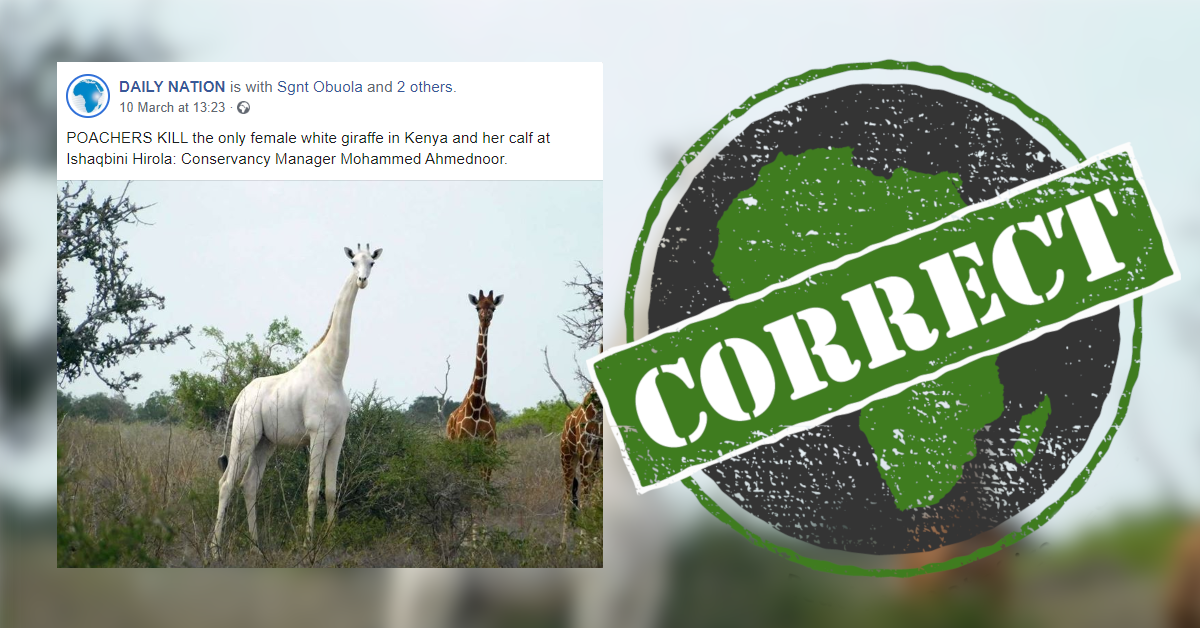When two rare white giraffes were filmed in a Kenyan conservancy in 2017, their existence had to be fact-checked.
But the pair, a female and her calf, have recently been killed by poachers.
The news was reported in a number of Facebook posts in early March 2020.
The posts were flagged as possibly false by the social network’s fact-checking system. But they’re all true.
“Poachers kill Kenya’s only female white giraffe and her calf,” reads the headline of one posted article.
The article says only the skeletons of the giraffes were found, which means they were probably killed months ago.

On 10 March the Hirola Conservation Programme confirmed on Twitter that the giraffes had been killed.
“We regret to announce the death of two rare white giraffes (adult female and her calf). The two carcasses were found by locals and are believed to have been killed by poachers,” the conservancy’s statement reads.
“This is a dark day not only to the conservation community but also to all Kenyans who took pride in the existence of this unique species.”
The Kenya Wildlife Service tweeted that they were investigating the giraffes’ deaths.
“We are investigating reports of the deaths of a white giraffe and a calf in Ishaqbini Conservancy in Garissa County. Our teams on the ground have seen bones believed to be those of the two giraffes. The bones are estimated to be four months old,” reads a statement by Ngugi Gecaga, the service’s acting head of corporate communications, posted on Twitter.
“The management of the conservancy informed us of the missing giraffe and calf after failing to see them for a period of time. We wish to inform the public that we work closely with all community managed conservancies in protecting wildlife.
“Our personnel on ground are jointly working with community rangers and the conservancy management to establish the facts about the incident.” – Dancan Bwire
But the pair, a female and her calf, have recently been killed by poachers.
The news was reported in a number of Facebook posts in early March 2020.
The posts were flagged as possibly false by the social network’s fact-checking system. But they’re all true.
“Poachers kill Kenya’s only female white giraffe and her calf,” reads the headline of one posted article.
The article says only the skeletons of the giraffes were found, which means they were probably killed months ago.

Carcasses found by locals
On 10 March the Hirola Conservation Programme confirmed on Twitter that the giraffes had been killed.
“We regret to announce the death of two rare white giraffes (adult female and her calf). The two carcasses were found by locals and are believed to have been killed by poachers,” the conservancy’s statement reads.
“This is a dark day not only to the conservation community but also to all Kenyans who took pride in the existence of this unique species.”
The Kenya Wildlife Service tweeted that they were investigating the giraffes’ deaths.
“We are investigating reports of the deaths of a white giraffe and a calf in Ishaqbini Conservancy in Garissa County. Our teams on the ground have seen bones believed to be those of the two giraffes. The bones are estimated to be four months old,” reads a statement by Ngugi Gecaga, the service’s acting head of corporate communications, posted on Twitter.
“The management of the conservancy informed us of the missing giraffe and calf after failing to see them for a period of time. We wish to inform the public that we work closely with all community managed conservancies in protecting wildlife.
“Our personnel on ground are jointly working with community rangers and the conservancy management to establish the facts about the incident.” – Dancan Bwire
Republish our content for free
For publishers: what to do if your post is rated false
A fact-checker has rated your Facebook or Instagram post as “false”, “altered”, “partly false” or “missing context”. This could have serious consequences. What do you do?
Click on our guide for the steps you should follow.
Publishers guideAfrica Check teams up with Facebook
Africa Check is a partner in Meta's third-party fact-checking programme to help stop the spread of false information on social media.
The content we rate as “false” will be downgraded on Facebook and Instagram. This means fewer people will see it.
You can also help identify false information on Facebook. This guide explains how.


Add new comment